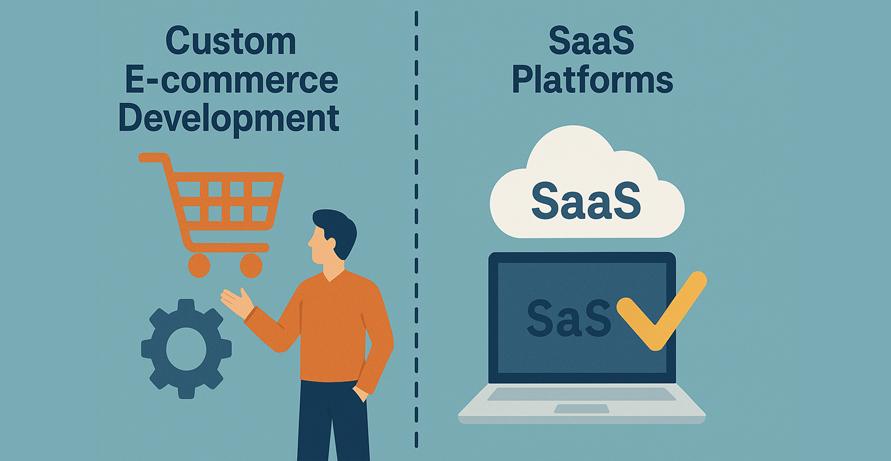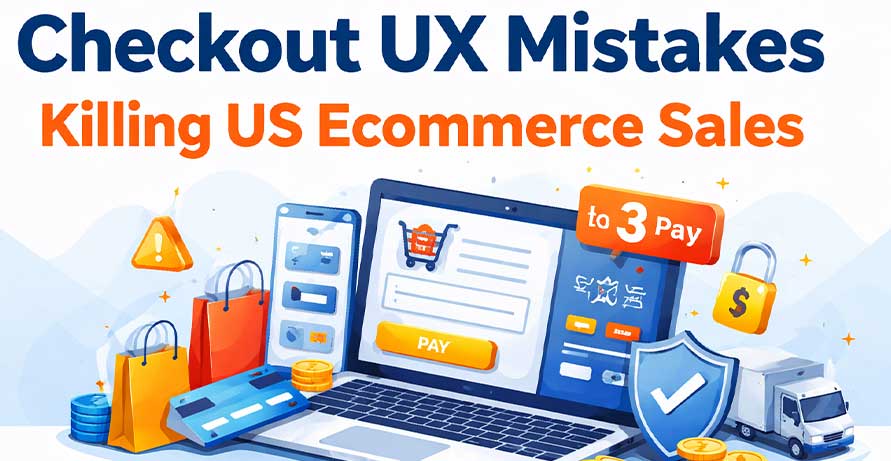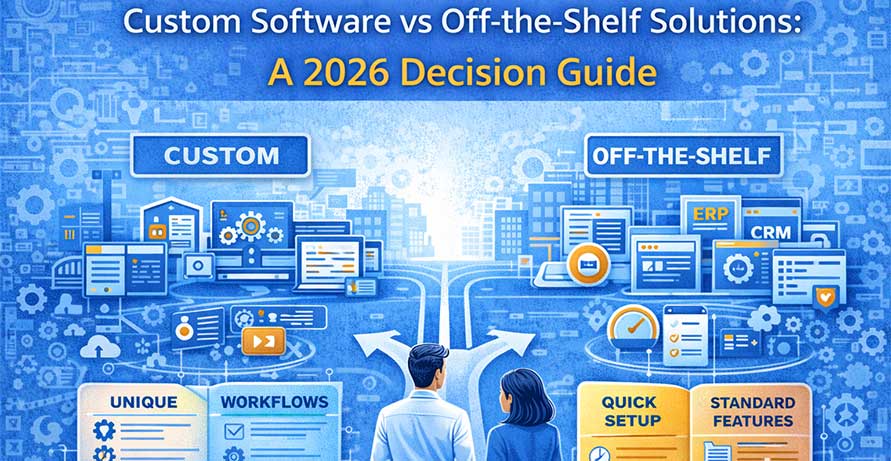Custom E-commerce Development vs. SaaS Platforms: Which is Best?

In today's digital era, businesses looking to sell online have two primary options: custom e-commerce development or SaaS (Software as a Service) e-commerce platforms like Shopify, BigCommerce, and Wix.
Both approaches have advantages and disadvantages; so, you'll need to choose the right one based on your business requirements, budget, and technical needs.
This guide will compare custom e-commerce development and SaaS platforms, helping you determine which option is best for your business.
What is Custom E-commerce Development?
Custom e-commerce development involves building an online store from scratch or using open-source frameworks like Magento, WooCommerce, or Laravel. This approach allows businesses to create a customized and scalable web store unique to their requirements.
Pros of Custom E-commerce Solutions
Total Customization & Control
- Custom development lets you decide everything about your store's design, functionality, and features.
- Unlike SaaS platforms, you're not bound by platform limitations or pre-determined templates.
Scalability & Performance
- Ideal for businesses with long-term growth plans.
- Can handle high traffic loads and complex product catalogues without compromising performance.
Enhanced Security & Data Ownership
- Greater security control, reducing vulnerability to cyber threats.
- You own the entire codebase and customer data, ensuring GDPR and compliance flexibility.
SEO & Marketing Freedom
- Custom solutions allow for advanced SEO optimizations, helping businesses rank better on search engines.
- There are no platform restrictions on metadata, page speed optimization, and integrations.
Cons of Custom E-commerce Development
- Higher Upfront Cost: Development costs are higher than those of SaaS platforms due to the need for coding, design, and infrastructure setup.
- Longer Development Time: A custom e-commerce website can take weeks or months to develop compared to a quick setup on SaaS platforms.
- Requires Technical Expertise: Custom e-commerce requires developer support for maintenance, updates, and feature enhancements.
What is a SaaS E-commerce Platform?
SaaS e-commerce platforms are pre-built, cloud-based solutions that allow businesses to launch an online store quickly without extensive technical knowledge. Platforms like Shopify, BigCommerce, Squarespace, and Wix provide ready-made templates, hosting, and payment integrations.
Pros of SaaS E-commerce Platforms
Quick Setup & Ease of Use
- No coding knowledge is required.
- Drag-and-drop builders make customization simple.
Lower Initial Costs
- Subscription-based pricing (e.g., $29/month for Shopify) reduces upfront costs.
- The provider handles hosting, maintenance, and security.
Automatic Updates & Security
- SaaS providers ensure the platform is constantly updated with security patches and new features.
Integrated Payment & Shipping Options
- Ready-to-use payment gateways like Stripe, PayPal, and Apple Pay.
- Simplified checkout processes for faster transactions.
Cons of SaaS E-commerce Platforms
Limited Customization
- Pre-built templates and features may not meet complex business needs.
- Custom integrations may be restricted.
Recurring Subscription Fees
- Monthly or annual fees can add up over time.
- Additional charges for premium features, plugins, and transaction fees.
Scalability Challenges
- It is not ideal for large-scale enterprises with high traffic and complex requirements.
- Vendor dependency for updates and support.
Custom Development vs. SaaS: Which One is Best?
Key Differences:
- Customization: Custom development allows total customization, while SaaS is limited to templates.
- Cost: SaaS costs less initially, while custom development is more expensive upfront.
- Time to Market: SaaS has a quicker setup, while custom development takes more time.
- Scalability: Custom solutions are more scalable than SaaS.
- SEO Control: Custom solutions provide complete SEO flexibility, whereas SaaS has some restrictions.
- Security: Custom platforms allow for stronger security measures.
- Data Ownership: Custom development provides complete data control, while SaaS platforms manage data on their servers.
When to Choose Custom E-commerce Development ?
- You need a highly customized, unique online store.
- Your business has complex functionality requirements.
- You plan for long-term scalability and SEO control.
- You want complete data ownership and security control.
When to Choose a SaaS Platform ?
- You need a quick and easy store setup.
- You have a limited budget and don't want high upfront costs.
- You prefer an all-in-one solution with hosting, updates, and security managed for you.
- You have a small to mid-sized business with simple e-commerce needs.
How Anchor Points Can Help You Succeed ?
At Anchor Points, we provide expert e-commerce development services tailored to your business needs. Whether you need a fully custom-built online store or SaaS platform customization, we have the expertise to deliver.
Our E-commerce Development Services Include:
- Custom E-commerce Solutions
- SaaS Platform Setup & Optimization
- Custom Design & UI/UX Development
- Payment Gateway & API Integrations
- SEO & Performance Optimization
- Security Enhancements
- Ongoing Support & Maintenance
We help businesses build scalable, high-performing e-commerce stores that drive conversions. Our team ensures that your online store meets your business objectives while delivering an exceptional user experience.
Conclusion
Choosing between custom e-commerce solutions and SaaS solutions depends on your goals, budget, and business needs. Saas Solutions are perfect for fast and cheap installations, whereas custom e-commerce solutions are the best choice for long-term scalability and complete control.








